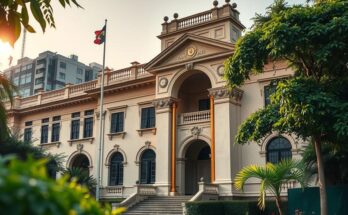On Wednesday, South Africa’s Finance Minister Enoch Godongwana revealed a revised budget, proposing a staggered VAT increase to 16% by 2026/27, which was met with strong opposition led by the DA. The budget allocates over one trillion rands to enhance infrastructure and public services but raises concerns about exacerbating poverty and governmental stability.
On Wednesday, South Africa’s Finance Minister, Enoch Godongwana, introduced a revised budget that included a scaled-back proposal for a value-added tax (VAT) increase. This announcement was met with significant backlash, particularly from the Democratic Alliance (DA), a key party in the country’s unity government. The newly outlined plan indicates a gradual VAT increase, elevating it to 16% by the 2026/27 fiscal year through a staggered approach.
The proposed VAT hike will take place in two phases: an initial 0.5% increase in the 2025/26 financial year, followed by another 0.5% in the subsequent year. Despite this more modest increase, the announcement was met with discontent, evident as several parliamentarians booed during the proceedings. Furthermore, the DA promptly rejected the budget, with its leader, John Steenhuisen, asserting a commitment to advocating for economic growth and job creation.
Minister Godongwana defended the tax policy by emphasizing that raising corporate or personal income taxes would adversely impact investment and job creation. He justified the VAT increase as a necessary strategy to fund essential public services, despite its universal impact on the population. The South African economy, the continent’s most industrialized, is grappling with a mere 0.6% growth rate in 2024, over 32% unemployment, and pervasive inequality.
According to World Bank estimates, around two-thirds of the South African population resides in poverty. The budget outlines an allocation exceeding one trillion rands (approximately $54.4 billion) over the next three years to bolster infrastructure, energy supply, and public services, while also enhancing funding for tax authorities to retrieve uncollected revenue. However, the DA expressed concerns that this budget could exacerbate poverty among South Africans and jeopardize the unity government’s stability, pledging to withhold their support. This uncertainty raises questions around the budget’s ability to secure the necessary parliamentary majority for approval.
In conclusion, South Africa’s newly proposed budget has sparked considerable outrage, particularly due to the planned VAT increases and their implications for citizens’ welfare. While the government aims to finance critical public services through this tax, the unified opposition from the DA raises challenges regarding parliamentary support. Effectively, the budget’s impact on poverty and economic growth remains a contentious issue as the nation addresses substantial economic hurdles.
Original Source: newscentral.africa




